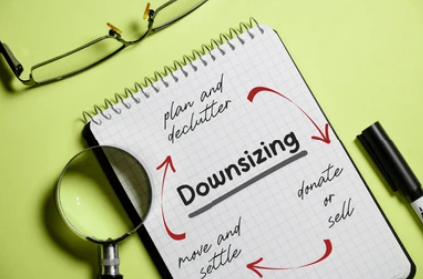
Top 10 downsizing tips and considerations
To find out more, book a time in my calendar: FIND OUT MORE

Before you think about moving, consider the following:
Lots of your friends are downsizing and your children think it would be a good thing to do, but you're undecided. What are your options and what do you need to consider?
Downsizing usually means moving house, and regardless of age is a challenging time. There are plenty of things to consider and it’s not a decision you should rush. First, ask yourself…
- What is the cost of staying?
- And what is the cost of moving? (It’s likely to be much more than you think.)
- Is this the right time to be making this decision? (It’s best to plan ahead when things are settled, not if you’re grieving or in crisis mode.)
- What do you like and dislike about the options you are considering?
- What services and support can you get now and what could you get if you were to move? (e.g., family/whānau, friends, access to health services, chemist, shops, home support services, interest groups, recreational areas and other important places.)
- If you don’t do anything, what is the worst that could happen?
- Are you just ready for a change?
Downsizing options may include: moving to a smaller place, getting a 60s plus unit, sharing accommodation, moving in with family or to a suitable cottage on family property, moving to supported living or a retirement village. All options have their pros and cons.
Moving home is stressful, even if you’re looking forward to it. As we get older we commonly find ourselves considering such a move after a health crisis or the death of a partner. The ideal time to make big decisions is NOT when we are grieving or in crisis. Sometimes added pressure comes from family/whānau or friends who, with best intentions, suggest you move into a retirement village or get a smaller house. The best way to avoid making decisions under pressure is to plan ahead. Figure out what’s important to you.
Your friends will have had their own reasons for you downsizing and your family/whānau well-meaning as they are, remember it's your decision and is best based on your own circumstances.
Staying put
There are often benefits in staying in a place where you are known, especially if you have the support of people who are important to you and/or those in your community. Equipment and/or adaptations to the home can make it safer and easier for you to live there.
Downsizing
Moving to a smaller place may be a good answer if your home is no longer suitable due to its location, stairs, too many rooms or garden too difficult etc. Downsizing doesn’t necessarily give the gains you might expect, e.g., your choice of home may be newer and require less maintenance so whilst it might be smaller it may cost more. Investigate fully and do the sums. If you own your home and the sale price is likely to be much more that the new home, this may be an opportunity to release equity to improve your lifestyle.
Ownership flat or 60s plus unit
Moving to an ownership flat or 60s plus unit is a compact option and, if it’s relatively new, usually has the advantage of being easily maintained. Over-60s units offer cluster-type housing. They usually operate on a body corporate model where you have unit title. Intending residents must meet entry age requirements. Check for annual costs such as rates, insurance and body corporate levies. You’ll probably be relatively close to neighbours and this has pluses and minuses
Sharing accommodation with people other than partners
This flatting-type of arrangement seems to appeal to friends or brothers/sisters. Financial arrangements vary widely from joint rental, unit title vested in one person, tenants in common etc. Expenses and household tasks are usually shared. Generally, each person has their own private space with some common areas. Some people also take in boarders. Clear house rules are important for the success of this option.
Moving to a ‘granny’ type cottage on family land
These cottages are usually on a family/whānau property, allowing you to live near to family yet independently. The purchase price is generally much lower than other housing options. To be suitable for older people these homes need to be self-contained, safe, easily accessible, and warm. Most are transportable. Contact the local council regarding any necessary consents.
Moving in with family/whanau
Moving in with family/whanau or them moving in with you can work well for those where: there are shared values and culture, everyone is respectful of one another and where clear, open communication is practiced.
Moving into a retirement village
This is an increasingly popular option for those looking for age-friendly homes and lifestyles. Pricing options vary considerably. www.retirementvillages.co.nz provides extensive information.
